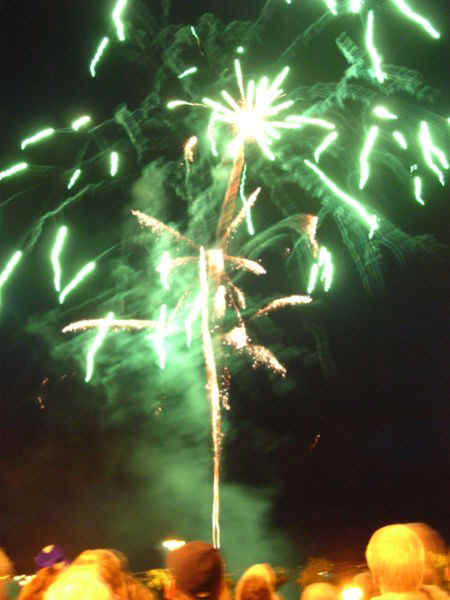
Guy Fawkes Night is tonight in Great
Britain. Dressed in costumes, people light Bonfires.
Fireworks fill up the skies. Little children go door to door, begging with the taunt,
"A Penny for the Guy".
Some say it celebrates the plot, and others say it celebrates the foiling of the plot, to
blow up the Houses
of Parliament by Roman Catholic conspirators who wished to kill King James I and the
Protestant rulers
of England On the November 5th, 1605 a justice of the peace found Guy Fawkes in a
rented cellar
beneath the House of Lords, with match in hand, about to light the fuse to 32 kegs of gun
powder.
Fawkes was arrested, tortured and hung. During a torture session on the rack, Fawkes
revealed that he
was a participant in an English Catholic conspiracy to annihilate England's Protestant
government and
replace it with Catholic leadership. The plot's leader, Robert Catesby,
an English Catholic whose father
had been persecuted by Queen Elizabeth I for refusing to conform to the Church of
England.and all the
others were soon tracked down and killed.
Guy Fawkes Celebration has served the purposes of many different groups. There is a fine
website that gives its history. http://www.bcpl.net/~cbladey/guy/html/toc.html
In 1604, England was at
war with Catholic Spain. Catholics were not widely not trusted in England. The
religious and traveling
rights of Catholics were strictly limited and priests were banished as some English
Catholics were linked
to foreign Catholics who wished to defeat the Reformation and hoped the Pope would richly
reward
them for delivering England to Rome. Here is a popular rendering of some
of the 12 conspirators:
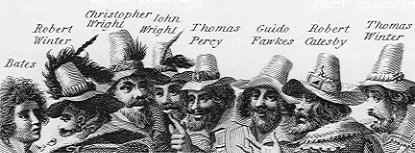
In 1606, Parliament established November 5 as a day of public thanksgiving. Ever since,
Guy Fawkes Day has been a holiday that both children and adults celebrate. As darkness
falls, the "Guy"
is tossed onto the bonfire, and set alight. Then the fireworks go off, and "the
Guy" goes up in flames. As
early as 1607 there are records
of bonfire celebrations on the 5th of November. James I had declared
the day a public holiday in his joy at the overthrow of the Gunpowder Plot. And ever
since then, guards
from the Tower of London have searched the Parliament cellars on the
opening day of each annual
session. The guards, who are also called yeomen of the guard or beefeaters, are supposed
to make sure
there are no kegs of gunpowder in the cellars. The first bonfires were set up to
burn effigies of the
Catholic pope. It was not until two centuries later that effigies of the pope were
replaced with those
of Guy Fawkes.
Religion divides like few other beliefs.
One can imagine how offensive this history must have
been to to Irish Catholics when Ireland was part of the Empire..
Nov. 5, 1775: "There will be no anti-Catholic
outbursts in the Continental Army.
Is that clear?"
Signed: George Washington
Washington did not want to alienate Canadian
Catholics
who were viewed
as important potential allies. He wrote he
would find it
"monstrous" any actions which might be insulting
their
Religion."

- Remember, remember the Fifth of November,
- The Gunpowder Treason and Plot,
- I know of no reason
- Why Gunpowder Treason
- Should ever be forgot.
- Guy Fawkes, Guy Fawkes, t'was his intent To blow up King and Parli'ment.
Three-score barrels of powder below
To prove old England's overthrow;
By God's providence he was catch'd
With a dark lantern and burning match.
Holloa boys, holloa boys, let the bells ring. Holloa boys, holloa boys, God save the King!
More Guy Fawkes Day songs
http://www.bcpl.net/~cbladey/guy/html/song.html#fawkes
 Midi
Music Midi
Music
|
Mischief Night - November 4th -
A more sinsiter night than
Holloween in the US.
"This celebration finds children up to lots
of pranks: Removing Gates, daubing windows with paint, coating doorknobs with treacle,
tapping windows, stuffing drainpipes with paper and setting them alight,filling tin cans
with ashes and hanging them on doorknobs and of course tying door knobs to rope and
knocking on the door and holding the other end till finally letting it go so the person
opening it falls on his back! Great fun! Go to it! This is also a good night to steal wood
for your bonfire and light your rival's bonfire early. But whatever you do -stay legal and
safe!
(Source: Iona and Peter Opie The Lore and
Language of Schoolchildren, Oxford, Clarendon,1961) |
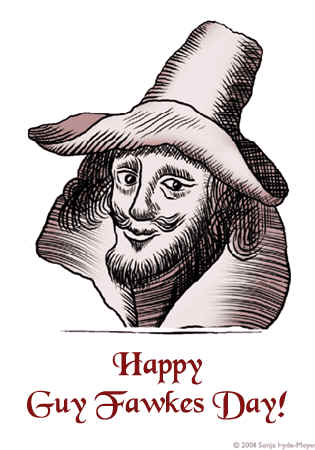
|
Crime and Gruesome Punishment
Guy Fawkes was
sentenced, along with the other surviving chief conspirators, to be hanged, drawn, and
quartered
in London. In this, they hung the
criminal, not around the neck but under the armpits, then tied horses to each leg
and spanked the horses' flanks. The
horses pulled until the criminal until he was split apart. Afterwards, they
chopped him longitudinally until his body
was in four big hunks. Moments before the start of his gruesome execution,
on January 31, 1606, he jumped from a
ladder while climbing to the hanging platform, breaking his neck and dying
instantly thus denying the crowd
asssembled all the fun of watching the drawing and quartering |
The Gunpowder Plot
"Originally the Catesby rented a house near to the Palace of Westminster and the
group began to dig a tunnel out under the Houses of Parliament. However progress was slow
for these gentlemen who were not used to such hard labour. Eventually, in March 1605,
Thomas Percy was able to use his connections at the Royal Court to rent a cellar right under the House of
Lords! The tunnel was quickly abandoned and, posing as Percy's servant, one "John
Johnson," Fawkes was able to fill the underground storehouse with some thirty-six
barrels of gunpowder hidden beneath coal and wooden sticks, a store of fuel for the
winter. Everything was set in place: all the conspirators had to do now was wait.
Perhaps they had prepared too early though, for doubts began to creep into the minds of
some of the plotters,
worried about fellow catholics who would be present in Parliament on the appointed day,
the 5th November. Only ten days before the Opening of Parliament, Lord Monteagle,
an apparently reformed catholic, was sitting down to dinner in his Hoxton home when an
important letter arrived for him. It read:
"My lord, out of the love I bear to some of your friends, I have a care for
your preservation. Therefore I would advise you, as you tender your life, to devise some
excuse to shift of your attendance of this Parliament, for God and man hath concurred to
punish the wickedness of this time. And think not slightly of this advertisement but
retire yourself into your country, where you may expect the event in safety, for though
there be no appearance of any stir, yet I say they shall receive a terrible blow, the
Parliament, and yet they shall not see who hurts them.. This counsel is not to be
contemned, because it may do you good and can do you know harm, for the danger is past as
soon as you have burnt the latter: and I hope God will give you the grace to make gooduse
of it, to whose holy protection I commend you."
 The authorship of the letter has never been
certainly identified, but Lord Monteagle was Francis Tresham's brother-in-law. The authorship of the letter has never been
certainly identified, but Lord Monteagle was Francis Tresham's brother-in-law.
Monteagle immediately showed the letter to Robert Cecil, the Earl of
Salisbury and Secretary of State. Though rather slow to act, the Privy
Council eventually had the vaults beneath the Lords searched on the 4th November, first by
the Earl of Suffolk
and late the same evening by Sir Thomas Knyvett. Composed to the end, Fawkes coolly let
the officials into Percy's cellar. Of course, the gunpowder was quickly discovered and Guy
Fawkes was overpowered.
On hearing that their plans had been foiled, Robert Catesby and Thomas Wintour fled to
the Midlands where they met up with the rest of their party in Warwickshire,
but failed to rally any support. They managed to travel amongst the houses of friends and
sympathisers for three days before finally being captured in a bloody raid
on Holbeche House in Staffordshire. Catesby, Percy and the two Wright brothers were
killed, while a wounded Thomas Wintour and Ambrose Rokewood were taken away to London.
Others were captured a few days later (though Robert Wintour was at large for some two
months). All the conspirators, save for Tresham were executed for their crimes.
Francis Tresham died while still a prisoner in the Tower of London and it has often been suggested that his
death was arranged to cover up his complicity in the uncovering of the plot. Whether
through genuine second thoughts or external pressures, Tresham may have warned his
brother-in-law, Lord Monteagle, of the plot some time before the arrival of the now-famous
letter and together they agreed upon this means of scuppering the plan, yet still giving
the conspirators enough time to escape. There is certainly much more to the famous
"Gunpowder Plot" than first meets the eye and its mysteries endure to this day.
How were these known trouble-makers able to so easily penetrate the inner sanctum of
English Government? And why did it take so long for the cellars to be searched? Is it
possible that the Earl of Salisbury had actually instigated the plot in order to frighten
the King into recognising the Catholic threat? A popular theory sees Guy Fawkes as an agent
provocateur with other plotters, like Tresham, acting as double agents. It seems more
likely, however, that Salisbury's agents merely infiltrated an existing conspiracy. He
then left the plot's unveiling until the last minute for added dramatic effect. In fact,
the King may never have been in any real danger." ( Source: http://www.britannia.com/history/kaboom.html
|

Some People, notably Scottish Socialists,
have a different view of Guy Fawkes.
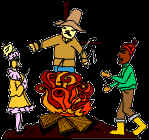
rateacross the UK on 5 November. The date marks the failed attempt to Bonfire
Night is celebrated across the UK on 5 November.
The date marks the failed attempt to blow up the Houses of
Parliament by Guy Fawkes1 along with a group
of co-conspirators in London in 1605
.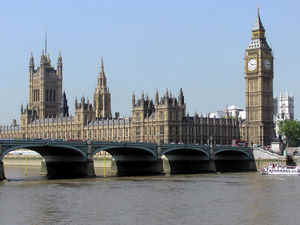 |
|
|





 The authorship of the letter has never been
certainly identified, but Lord Monteagle was Francis Tresham's brother-in-law.
The authorship of the letter has never been
certainly identified, but Lord Monteagle was Francis Tresham's brother-in-law.

